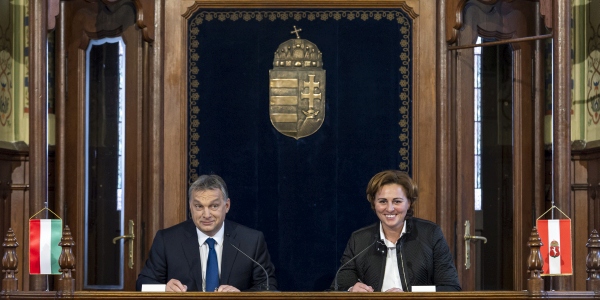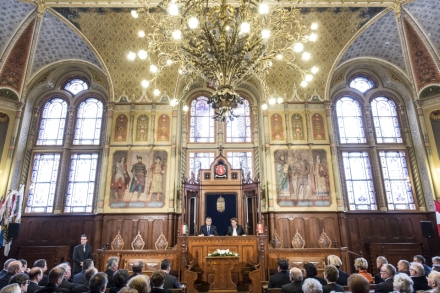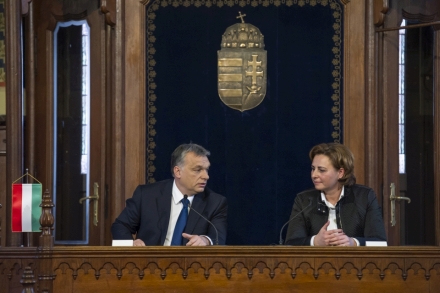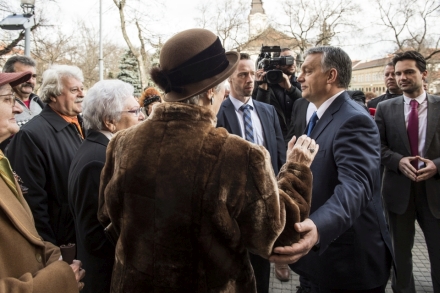
Kecskemét can establish an economic development fund worth HUF 25 billion
9 February 2016
As part of the Government’s Modern Cities Programme, Prime Minister Viktor Orbán and Mayor of Kecskemét Klaudia Szemereyné Pataki have signed an agreement, according to which the Government will provide Kecskemét with HUF 25 billion for the establishment of an economic development fund which will provide loans to viable commercial enterprises.
At a press conference held in Kecskemét City Hall, the Prime Minister announced that a new runway for civil aviation will be constructed at the city’s airport. The electricity grid will also be developed in order to provide industrial parks with continuous electricity supplies.
Mr. Orbán also announced that the Government will provide HUF 18 billion for construction of the final phase of the ring road around Kecskemét, and for creating a dual carriageway by widening the section of Route 52 leading to the city. A university research centre will also be established, he said, adding that further discussions are needed in this area.
The agreement also includes upgrading work to the main railway station, the construction of a P+R facility and development of the suburban transportation system.
Mr. Orbán also spoke about the development of the Kodály Institute and the construction of a new 250-seat concert hall, for which the Government will allocate HUF 3 billion. He also announced the construction of a bilingual vocational school of economics with boarding facilities, which will serve the purposes of dual education. The Government has allocated HUF 1.5 billion for this.
Mr. Orbán said that the City Hall is a national asset, and HUF 4 billion will be provided for its renovation. In his speech he expressed thanks for the “enduring camaraderie” of local people, who supported Christian and civic forces even in hard times. He emphasised that it was easy to come to an agreement with Kecskemét, because there taxpayers’ money bears fruit, and does not end up “in a bottomless pit”.
He pointed out that over the past five years the Government has taken over debts from Kecskemét amounting to HUF 16.7 billion, which together with state and EU funding of HUF 80-85 billion amounts to development potential worth HUF 100 billion.
The Prime Minister said that the key issue in the talks with the city’s leaders was whether Kecskemét will be able to produce another ten years of development after the first ten-year period.
Mr. Orbán emphasised that this support is provided by a country which six years ago was in a state of financial collapse and was only being kept alive by loans. In this respect he said that having repaid its debt to the IMF, in 2016 Hungary will repay the last instalment of its EU loan, which amounts to around HUF 600 billion. The outstanding efforts of Hungarians – which also show fantastic results in terms of figures – must therefore be analysed in this context, he explained.
The Prime Minister also said that projections show that over the next ten years Kecskemét’s current population of 110,000 could increase to 130,000. He added that “Kecskemét will be connected to Szolnok, Cegléd and Dunaújváros”, and it will become a major centre of the region. Development funds must therefore be evaluated in this light.
In response to a question, he said that in Hungary the general view of EU funds is that it is a windfall. He emphasised that this is not the case, saying that if we compare development funds coming to Hungary with money taken out of the country by foreigners for various reasons, we can see that the sums are approximately equal.
The Prime Minister also said that the Government is currently involved in negotiations with Mercedes which are not yet fully public. He said that the company has a number of ideas for developments which are being competed for by one Hungarian, three Polish and two Czech locations. He added that there is also another investment relating to an earlier development, and one which will provide new opportunities to Hungarian suppliers.
Mayor of Kecskemét Klaudia Szemereyné Pataki spoke about efforts aimed at strengthening the city’s economy. She emphasised that, in spite of a twenty per cent cut in corporation tax, the city’s tax revenues have increased, and have even doubled over ten years.
She pointed out that Kecskemét is the seventh largest Hungarian city by population, but in terms of its economic and cultural importance it is in third place, after Debrecen and Győr. She said that Kecskemét is a regional capital which is also a centre in terms of economy, education, culture and public administration.
To coincide with the Prime Minister’s visit to Kecskemét, local organisations from the opposition party Democratic Coalition held a demonstration at the Kossuth Statue in front of the City Hall. Mr. Orbán was thus also received by participants in the demonstration, with whom he and the Mayor talked for about half an hour.
MTI; Photo: Károly Árvai/kormany.hu






